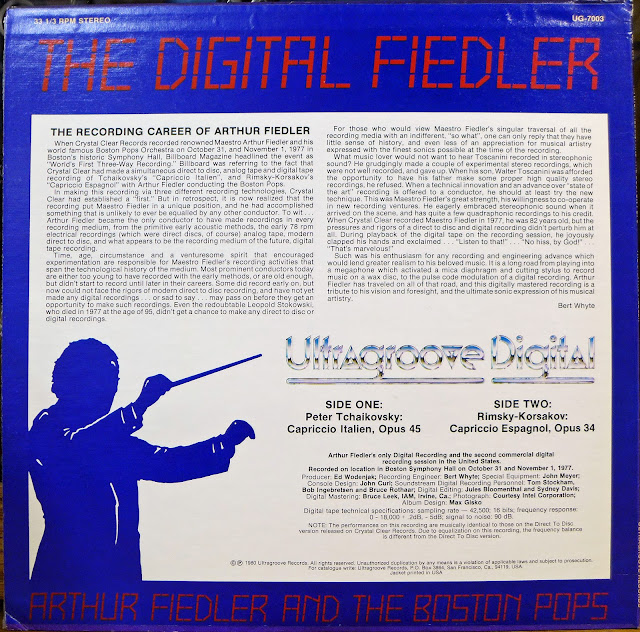September 9, 2022
#451
Gentle reader,
I was looking through and playing my dbx encoded LP records and came across one titled Digital Fiedler.
Any fan of Classical music will (hopefully) recognize "Fiedler" refers to the late, great, Arthur Fiedler, decades-long conductor of the famed Boston Pops Orchestra.
Well, it turns out, that in the autumn of 1977, when he was 82 years old, he agreed to do something he had never done with the Pops, before. Three things, it turns out. See below.
I was reading the back cover of Digital Fiedler and it reads, "Billboard Magazine headlined the event as 'World's First Three-Way Recording.'...Crystal Clear (Records) had made a simultaneous direct to disc, analog tape and digital tape recording of Tchaikovsky's 'Capriccio Italian', and Rimsky-Korsakov's 'Capriccio Espagnol' with Arthur Fiedler conducting the Boston Pops."
N/MINT AUDIOPHILE ARTHUR FIEDLER Capriccio Italien CRYSTAL CLEAR DIRECT TO DISC
It arrived today and I put it on. A little surface noise at the beginning, but it played well and loudly. In fact, the last paragraph on the back cover reads thus, "In playing back this recording, for best results, and to achieve proper balances and enjoy the full dynamic range of the music, we strongly urge you to playback at high volume levels, and at the same time, pay proper attention to the fusing of your loudspeakers."
Who am I to argue with the record producer? Earlier, on the back cover, they wrote, "With a frequency response within plus or minus 3 dB from 7 Hz to 25 kHz... Dynamic range and signal to noise ratio exceeds 80 dB."
That seems awfully high for an LP to achieve, but, again, who am I to argue? Since I have only one turntable, and one dbx decoder, I had to play them one after the other.
Hopefully, you will be able to enlarge this photo [clicking on any picture will open a second window over this one (on a PC or laptop, anyway) and they will be larger] enough to read the text.
If you are not familiar with dbx encoded tapes and LP records, this sheet was within the cover along with the record. Other dbx discs I have, it is printed somewhere on the cover.
I have written about dbx encoded LP records before, here is a link to that article:
The Robb Collections: DBX Encoded LP Records. Are They As Amazing Sounding As Some Say?
I only had three at that point, but have many more now. That article shows the dbx decoder/encoder I have, the interconnects and more. Please read it when you finish this article.
Since I am 66 and aside from a few times playing music louder than I should and having attended rock concerts (also having season tickets to the Richmond Symphony), plus working in very loud shops for decades, I have some hearing loss. Thus, I turn the treble up higher than most.
That being said, I heard distinct hiss at the beginning of the dbx disc. I turned the treble to normal and it went away.
The d-2-d record was played first. As I wrote above there was a little ticks and pops at the beginning, but all-in-all, the record sounded wonderful, and loud. I no longer have a dB meter, so could not verify their dynamic range claims.
The dbx record was next. It too sounded wonderful. While I have well over 1,000 classical recordings, analog and digital, I cannot pick out an orchestra just on it's sound alone. Both capriccios (capricci?) are two of my favorites and the Boston Pops did superbly.
Since they were both recorded simultaneously, I would love to have been able to do a blind test. But, I cannot. To me, they both sounded wonderful. Anyone out there have the wherewithal to be able to do a blind test of these two LPs?
Back to playing dbx records. One of them had a track titled, Boy With Goldfish by Jerre Tanner. It was an excerpt, but it was more than enough to get me excited. It is choral with full orchestra. I looked on eBay and found a sealed SACD and a sealed LP of the same (there may be only one?) performance. Done by the London Symphony Orchestra conducted by Lee Holdridge. That will be what the next article is about.
Thank you SO much for taking the time to read this article. Music is one of my passions as is writing and photography.
Scott Robb
September 9, 2022
#451
Feel free to leave a comment below or on Facebook.







